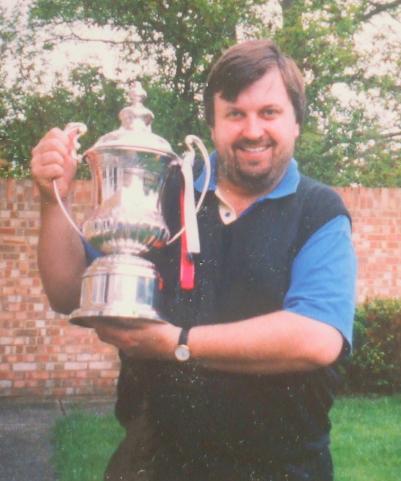Lest We Forget: In Memory of Maidenhead and Maidenhead Norfolkians Players Who Lost Their Lives in The Two World Wars Part Two: First World War
10/10/2022 - 3.08
Mark Smith and Matthew Shaw
This is the second in a series of articles that commemorates the lives of Maidenhead and Maidenhead Norfolkians players who made the ultimate sacrifice in World War One and World War Two, based on the Maidenhead United FC match day programme series entitled Lest We Forget.
Oliver Reed
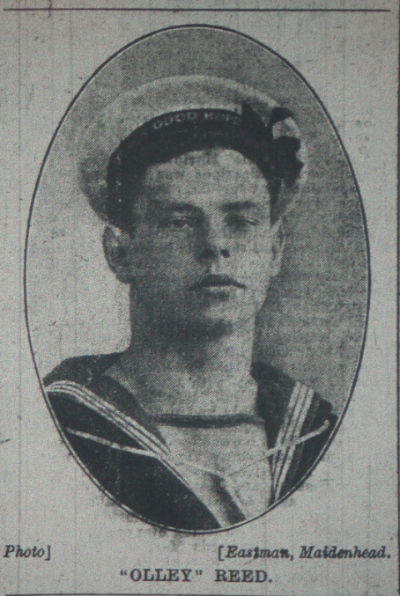
Source: Maidenhead Advertiser
Oliver Reed was born on 29th March 1885 and lived at 117 Powney Road, Maidenhead with his wife Gertrude. He was a decorator and a serving sailor in the Royal Navy.
The Maidenhead Advertiser of 25th November 1914 reported his death with a detailed obituary which read:
“Fears that “Olley” Reed, the well-known and popular Maidenhead footballer had perished on board HMS Good Hope which was sunk in the battle of Coronel off the Chilean coast on 1st November 1914 have, we regret to state, been confirmed. On Monday, Mrs Reed, who lives at 117 Powney Road, Maidenhead, received the official information from the Admiralty intimating to her that ‘Oliver Reed, rating Able Seaman, is believed to have been on board HMS Good Hope when that vessel was sunk on the 1st inst. Under these circumstances it is feared that in the absence of any evidence to the contrary he must be regarded as having lost his life.’ Accompanying the notice was a type written letter signed by the First Lord of the Admiralty, Mr Winston Churchill, which read ‘The King commends me to assure you of the true sympathy of His Majesty and the Queen in your sorrow’. Mrs Reed has a little daughter of about two years old to console her in her great loss.”
HMS Good Hope was one of four Drake-class armoured cruisers built for the Royal Navy around 1900; she was originally named Africa, but was renamed before she was launched. She became flagship of the 1st Cruiser Squadron of the Atlantic Fleet in 1906, and was the flagship of the 2nd Cruiser Squadron in 1908. She was reduced to reserve in 1913, but was recommissioned in mid-1914. When war was declared in August 1914, Good Hope was ordered to reinforce the 4th Cruiser Squadron and became the flagship of Rear Admiral Christopher Cradock. Cradock moved the available ships of his squadron later that month to the coast of South America to search for German commerce raiders. He was then ordered further south to the Strait of Magellan to block any attempt of the German East Asia Squadron to penetrate into the South Atlantic. He found the German squadron on 1st November 1914 off the coast of Chile. The German squadron outnumbered Cradock's force and were individually more powerful. They sank Cradock's two armoured cruisers in the Battle of Coronel. HMS Good Hope was lost with all hands.
The following appreciation was written by someone who knew the unfortunate young man well as a footballer for the club:
“Olley was one of the stalwarts of the strong Maidenhead Reserve team which, in season 1910/11, carried all before them and possessed the Berks & Bucks Junior Cup, the Norfolkian Charity Cup, the Berks & Bucks Junior League medals which were won that season. He was one of the most fearless players in the club, and although by no means a giant in stature, was of splendid physique. Half back was his best position and during the last two seasons he played many games for the 1st eleven. Ever ready for a game, he was one of the most loyal players in the football club and never known to fail the club when needed. He was popularly known as the “seaman gunner” and many humorous and flattering references to him were made in the notes of the “Football Observer”. His good nature was one of his chief characteristics and, although he knew how to hold his own, he never lost his temper on the football field. Olley’s “portmanteau” was always the subject of much good natured chuff when the team went off for away matches. It consisted of string and brown paper, and was a never ending joke amongst his chums. The Maidenhead Football Club mourns the loss of a loyal player by whose death the country has lost one of her bravest “sons of the sea.”
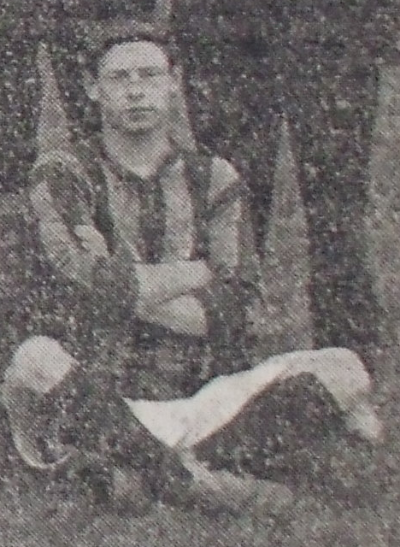
Oliver Reed in the 1910/11 Reserve team photograph. Source: Maidenhead Advertiser
Known 1st team appearances = 24, 3 goals (almost certainly more but detailed information unavailable)
Debut - 5th November 1910 at Hanwell (Great Western Suburban League)
Final appearance - 23rd April 1914 at Maidenhead Norfolkians (Great Western Suburban League)
Known Reserve team appearances = 53, 27 goals (would have been more but detailed information unavailable)
Member of the Maidenhead United Reserve team that won the South Bucks and East Berks League, the Berks and Bucks Junior Cup and the Maidenhead Norfolkian Cup in 1910/11 season.
Douglas John Scott
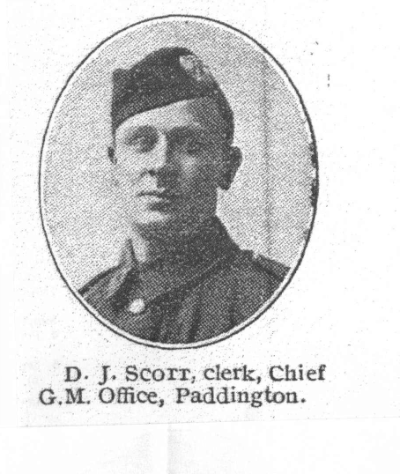
Source: Valerie Blackwell (Family)
Douglas John Scott was born on 21st November 1885, at Hammersmith, the son of John Theophilus and Mary Jane Scott (née Griffin) of 12 King’s Grove, Maidenhead. He had three brothers, George, Alfred and Henry. Douglas attended Maidenhead Boys School in Shoppenhangers Road and joined the Great Western Railway as Boy Clerk on 28th May 1901, aged 16. He progressed to become the Clerk in the General Managers Office. Douglas began playing for Maidenhead FC in 1905 at the age of 20 and played sporadically until the 1913/14 season although he was twice a member of the Club Committee and was Deputy Captain of the Reserve team in 1908/09 season. He also played four times for Maidenhead Norfolkians in the 1912/13 season making his debut on 21st September 1912, against Uxbridge.
As Douglas had a reserved occupation (working for the Great Western Railway), he wasn’t conscripted until the latter part of 1916. In December that year, Douglas joined the 2nd Battalion/14th London Regiment (London Scottish), which was a second line Territorial unit formed in September 1914 initially from troops from the 1st Battalion who had not volunteered for service overseas. The Battalion had been ordered to Salonika in December 1916 and during 1917, they were in action during the Battles of Doiran. The unit then moved to Egypt, concentrating at Moascar before advancing into Palestine. They were then in action during the Third Battle of Gaza including the capture and defence of Jerusalem. In 1918, they saw action in the capture of Jericho, Tell’Asur, the 1st Transjordan raid (as part of Shea’s Force) and the attack of Amman.
Douglas was killed in action in Palestine on 30th April 1918, aged 32 during the 2nd Transjordan Attack on Shunet Nimrin and Es Salt, also known as the second action of Es Salt and the second battle of the Jordan. The attack was designed to capture Amman and dislodge the German and Ottoman defenders from around Es Salt, whilst cavalry captured Es Salt itself but, in actuality, the cavalry made little progress against the defending units and the British had to abandon Es Salt in the following days. Douglas was buried in the Jerusalem War Cemetery. Tragically two of his brothers were also killed in action, Henry died in France in January 1916, aged 27, and Alfred was killed in the Somme in October 1916, aged 25.
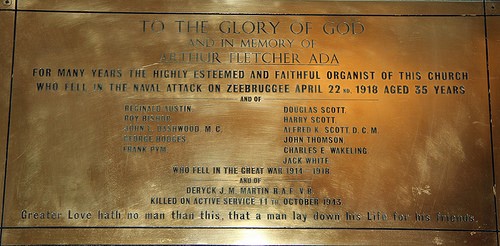
The Memorial plaque in the Baptist Church, Marlow Road, Maidenhead. Source: Valerie Blackwell (Family)
Known 1st team appearances = 4, 1 goal (would have been more but detailed information unavailable)
Presumed Debut – 27th November 1909 v Reading Grovelands (Reading Town Cup)
Presumed Final appearance – 25th October 1913 v 2nd Coldstream Guards (friendly)
Known Reserve team appearances = 16 (would have been considerably more but our records are decidedly incomplete)
Presumed Debut – 2nd December 1905 at Burnham (Berks and Bucks Junior Cup)
Presumed Final appearance – 20th January 1912 at Burnham (Berks and Bucks Junior Cup)
Deputy Captain of the Maidenhead United Reserve team in 1908/09 season and member of the Maidenhead FC Committee in 1909/10 and 1913/14 seasons
Eustace Lawrence Spindler
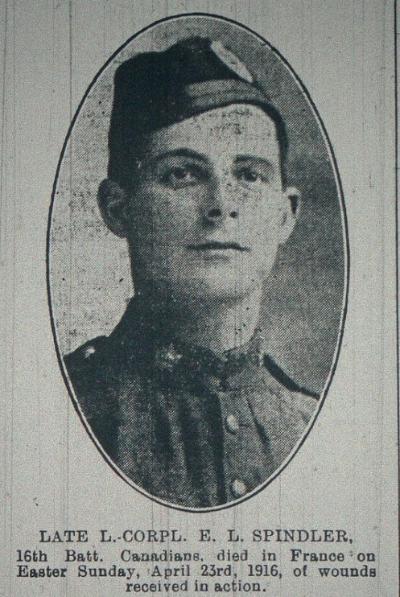
Source: Maidenhead Advertiser
Eustace Lawrence Spindler was born on 15th June 1891, in Maidenhead and was the son of Edwin Spindler and Ellen Spindler (née Burrows) of 60 High Street, Maidenhead. Eustace attended the Maidenhead Boys School in Shoppenhangers Road and worshipped, with the family, at St Luke’s Church in St Luke’s Road, Maidenhead. Edwin and Ellen had ten children, nine of whom survived and were named Ellen, Edwin, Ella, Ethel, Evan, Eva, Edgar, Elsie and Eustace. Eustace and Edgar Spindler played regularly for Maidenhead FC, Edgar between 1903 and 1910 and Eustace between 1908 and 1910, predominantly for the 1st team.
Eustace was employed as a Baker in his father’s confectionery business in Maidenhead but emigrated to Canada in October 1913, departing from Liverpool on the Steam Ship Arabic. He arrived in Boston, Massachusetts, United States of America on 16th October 1913, aged 22. Eustace joined the Canadian Infantry on 2nd January 1915, in Winnipeg, having previously spent four years as a Troop Sergeant, having volunteered to join the Royal Buckinghamshire Hussars. He subsequently became a Lance Corporal in the 16th Battalion Canadian Infantry (Mantoba Regiment). In April 1916, the Canadian divisions were involved in action around Poperidge and Ypres Salient in Belgium.
In the book The History of the 16th Battalion (The Canadian Scottish), it was written:
“Amongst the Armageddons of history will surely be named the Ypres Salient. Within its bounds, the British and Overseas troops met with one fifth, or 570,000, of the total casualties incurred by them in the whole of the 1st World War on all fronts. Of that total, 160,000 represented those killed and of the deceased 58,000 were interred as unknown graves. These are tragic figures, indicating nearly a climax of suffering and sacrifice in a war, which of all wars exacted a high price of both.”
Eustace died of wounds received in action at the No. 10 Casualty Clearing Station at Ypres, Belgium, on Easter Sunday, 23rd April 1916, aged 24. He is buried in Lijssenthoek Military Cemetery in Belgium and is commemorated on the War Memorial in St Ives Road, Maidenhead, as well as on memorials at St Luke’s Church, Norfolk Road and the Maidenhead (Desborough) Boys School.
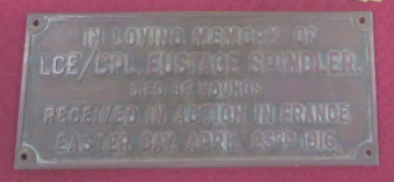
St Luke’s Church, Memorial. Source: Steve Rolls
Known 1st team appearances = 39, 16 goals (would have been more but detailed information unavailable)
Presumed Debut – 11th April 1908 v Reading Amateurs (friendly)
Presumed Final appearance – 25th March 1910 v 2nd Scots Guards (Great Western Suburban League)
Known Reserve team appearances = 3, 1 goal (would certainly have been more but our records are decidedly incomplete)
Presumed Debut – 19th December 1908 v Maidenhead Norfolkians Reserves (Berks and Bucks Junior Cup)
Presumed Final appearance – 23rd January 1909 v Burnham (Berks and Bucks Junior Cup)
Austin Joseph Walton
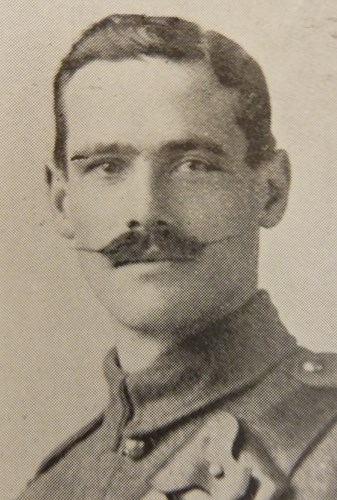
Source: Steve Rolls
Austin Joseph Walton was born in 1879, his birth being registered in Cookham, the son of Sarah Walton and Isaac (also spelt Izack) Alfred Walton. Austin had three brothers, Claude Montague, Alfred and William, who were all regular players for the “Red & Blacks” in the pre-World War One period. His mother, Sarah, was the landlady of the “Prince Albert” public house in King Street, Maidenhead between 1891 and approximately 1903. Her husband, Isaac, died at the age of just 38, and their son William then took over from Sarah as landlord.
Before joining the Army in 1914, Austin worked as an estate agent and played for Maidenhead Football Club between 1899 and 1904. He married Laura Louise Gabb in Reading in 1915 and the family lived at 9 High Town Road, Maidenhead. Austin was a member of the Maidenhead Gymnastic Club and took part in public displays whilst also instructing others in the district. He was Secretary of the Maidenhead Wanderers’ Cycling and Athletics Club and other organisations and, possessing a fine voice, was in demand at social gatherings and public concerts having been a member of the Bray Church Choir for fifteen years.
He was an occasional player as a back for the Maidenhead 1st and Reserve teams. Unfortunately, broke his collarbone in the South Bucks and East Berks League fixture against Burnham on 5th November 1898. He rarely scored but managed a hat-trick in a Reserve team friendly fixture against Maidenhead Thursday on 14th November 1901.
Austin was a member of the 10th Battalion, Cavalry Reserve Regiment of Hussars. On 16th April 1916, the Irish Republicans began the Easter Uprising and British Troops, including Austin’s Regiment, were sent to retake key buildings in the city and its environs. Under the command of Captain H. F Partridge, a party of men went out on Friday, 28th April, having been detailed to hold the “United Services Club” overlooking St. Stephens Green in Dublin. Austin was moving to his position when he was hit in the side of the head by sniper fire and died instantly. In a letter to his wife, Captain Partridge described Austin as “…having splendid qualities, being so conscientious and doing his duties so well.” Austin was buried at Grangegorman Cemetery.
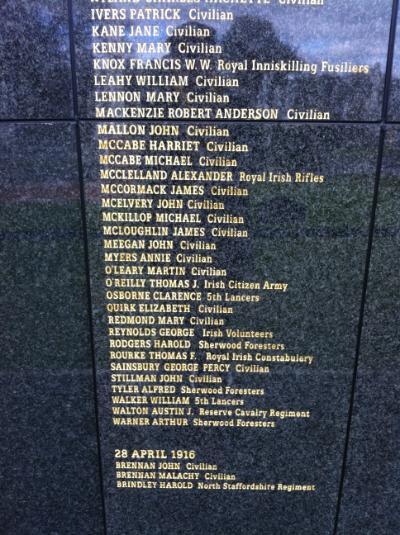
Glasnevin Cemetery, Dublin – Memorial plaque. Source: Steve Rolls
Note
The Birth Registry at Cookham gives his birth as 4th quarter 1879 which would have made him 37 when he died, not 35; The date of his death is given as 27th April 1916 on the Glasnevin Memorial which conflicts with the date of death, one day later, in the obituary in the Maidenhead Advertiser.
Known 1st team appearances = 20 (but our records during this period are decidedly incomplete)
Presumed Debut – 19th April 1897 v Stanley (friendly)
Presumed competitive debut – 8th October 1898 at Wolverton L. N. W. R (Southern League Division 2)
Presumed Final appearance – 30th January 1904 at Abingdon (West Berks League)
Known Reserve team appearances = 13, 5 goals (would definitely be more but our records are very incomplete)
Presumed Debut – 25th December 1896 v Wycombe Wanderers Reserves (South Bucks and East Berks League)
Presumed Final appearance – 26th December 1902 at Bisham (friendly)
Additional Information and Sources
Berkshire Yeomanry Museum website.
Valerie Blackwell
Colin Cutler
Bridget Hole
Dave Lawton
Lesley Norris
Steve Rolls
John and Robert Spindler
Biographies
Mark Smith attended his first Maidenhead match in March 1976 and continued to watch games fairly regularly for the next forty years. He was responsible for producing the club’s first ever “Handbook” in 1978, and has researched and chronicled the club’s history ever since. He was responsible for organising five exhibitions on the club, two at Maidenhead Library and three at the Maidenhead Heritage Centre (“The Magpies Story”). He has also written four books – Maidenhead FC 1870 – 1914; Maidenhead United 1919 – 1995; Maidenhead United 1995 - 2005, and, to coincide with the club’s 140th anniversary, published a 352-page detailed history entitled “One for Sorrow, Two for Joy” in 2011.
Aside from writing many series for the match programme (such as “Past Maidenhead Greats” and “An A-Z of Maidenhead United”) together with standalone articles, Mark also compiled “One of the Fifteen” on the fifteen players who appeared in the first ever Maidenhead FC match in December 1870, and “Lest We Forget” on those associated with Maidenhead FC and Maidenhead Norfolkians who lost their lives during the two World Wars. He also arranged to have the Maidenhead United Heritage website created - www.mufcheritage.com in 2009.
Matthew Shaw has played for several local football teams and became interested in the history of local football as members of his family have always been involved in football in the Berks and Bucks Counties as far back as the 1870s.
When researching family involvement in clubs in the combined counties, Matthew focused on pre First World War local football and the impact the war had on local teams.
Matthew has researched the Maidenhead Norfolkians FC in depth and helped the Maidenhead United FC Historian Mark Smith on all things Norfolkians. This meant he was also greatly involved in Mark's series "Lest We Forget" that was featured in Maidenhead United home programmes, as Matthew had already researched a large number of the town's footballers from both Senior and Junior clubs who had lost their lives in the Great War.
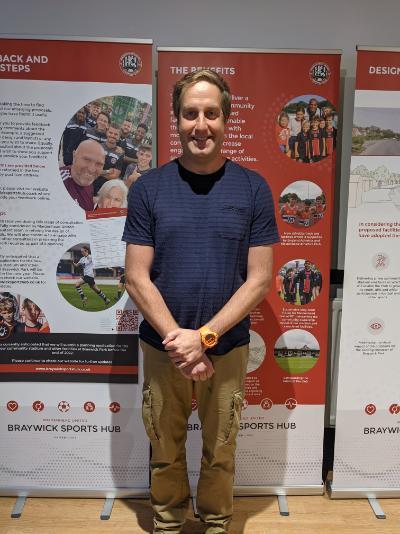


/prod01/wlvacuk/media/departments/digital-content-and-communications/images-2024/240624-Alumni-Awards-2024-Resized.jpg)
/prod01/wlvacuk/media/departments/digital-content-and-communications/images-18-19/220325-Engineers_teach_thumbail.jpg)
/prod01/wlvacuk/media/departments/digital-content-and-communications/images-2024/240627-UN-Speaker-Resized.jpg)
/prod01/wlvacuk/media/departments/digital-content-and-communications/images-2024/240320-Uzbekistan-Resized.jpg)
/prod01/wlvacuk/media/departments/digital-content-and-communications/images-2024/240229-The-Link-Resized.jpg)
/prod01/wlvacuk/media/departments/digital-content-and-communications/images-2024/240627-Lady-Aruna-Building-Naming-Resized.jpg)
